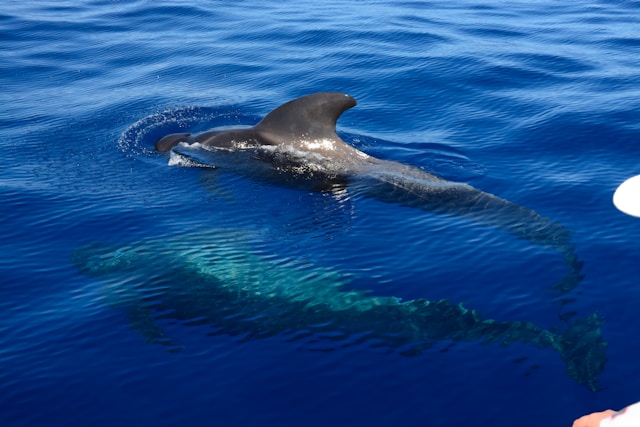Experts deem the event the largest mass stranding in decades, with only a slim chance of rescuing the surviving whales
A tragic scene unfolded on Tresness Beach in Sanday, Orkney, as 77 pilot whales became stranded, marking one of the most significant mass strandings in decades. The British Divers Marine Life Rescue (BDMLR) reported that while 12 of the whales still show signs of life, their chances of survival are slim.
The stranded pod included both males, reaching lengths of up to 7 meters, and females along with juveniles, creating a heartbreaking sight for local residents and marine rescuers alike. As the community grapples with this devastating event, experts are investigating the possible causes behind such a large-scale stranding. Initial assessments suggest that social bonding might have played a role, with healthy whales possibly following a distressed pod member into danger.
Embed from Getty ImagesEmma Neave-Webb from the BDMLR described the situation as a “big, big incident,” emphasizing the urgent need for proper assessment and potential rescue operations. As the community remains on high alert, specialists from the BDMLR, Scottish SPCA, and marine veterinarians from the mainland are en route to provide assistance.
Preliminary reports indicate this could be Scotland’s most significant stranding since the establishment of the Scottish Marine Animal Stranding Scheme (SMASS) in 1995. Although similar mass strandings have occurred in recent years, the scale of this event is unprecedented, highlighting the fragility of marine ecosystems.
Local authorities have urged the public to maintain a safe distance from the whales to ensure a thorough evaluation of the situation. While the emotional toll on the community is palpable, the incident serves as a poignant reminder of the ongoing challenges faced by marine wildlife.
Analysis
Political Perspective
The mass stranding of pilot whales raises important political questions about marine conservation policies in the UK. As environmental challenges intensify, incidents like these highlight the need for robust regulations to protect marine life. Policymakers must consider implementing measures to mitigate human impact on the oceans, which includes assessing the consequences of fishing practices, shipping routes, and habitat destruction.
Social Perspective
This event resonates deeply within the community, drawing attention to the social implications of wildlife conservation. The public’s emotional response underscores the connection between people and nature, as many feel a strong sense of responsibility toward these stranded creatures. Local organizations may leverage this incident to foster community engagement and raise awareness about marine conservation efforts.
Racial Perspective
The incident also brings to light the role of indigenous knowledge and practices in marine conservation. Communities with a historical connection to the land and sea often possess valuable insights into wildlife behaviour. Recognizing and incorporating these perspectives can enhance conservation strategies and create a more inclusive approach to marine stewardship.
Gender Perspective
In the context of conservation efforts, gender dynamics can influence community responses to environmental crises. Women often play crucial roles in grassroots movements, advocating for animal welfare and environmental justice. Their contributions can drive community action and shape policies aimed at protecting marine life, illustrating the need for diverse voices in conservation dialogues.
Economic Perspective
The economic implications of this mass stranding extend beyond immediate rescue efforts. Coastal communities often rely on healthy marine ecosystems for their livelihoods, including fishing and tourism. The stranding serves as a stark reminder of the economic risks associated with environmental degradation, prompting a reassessment of sustainable practices that support both community welfare and marine health.
